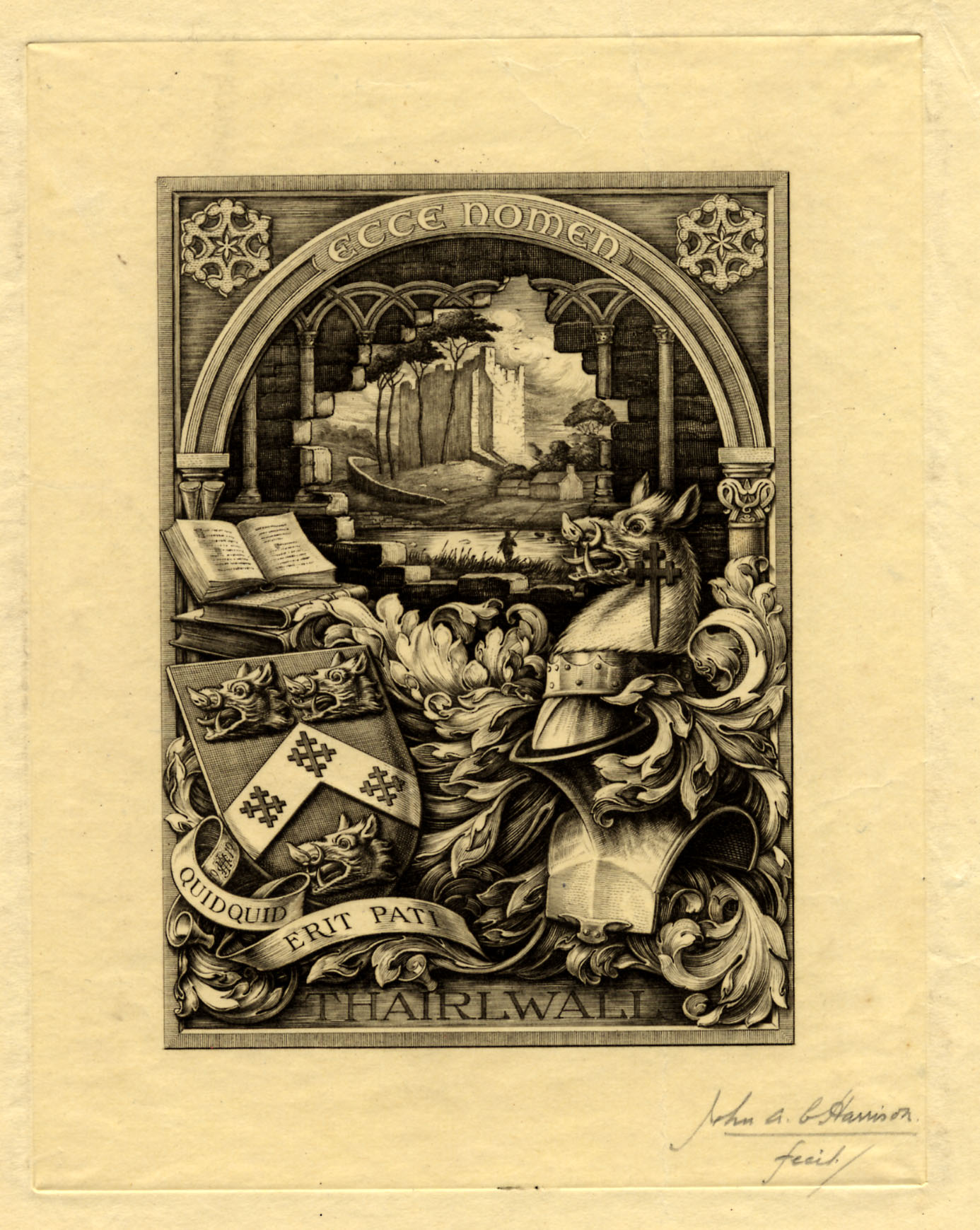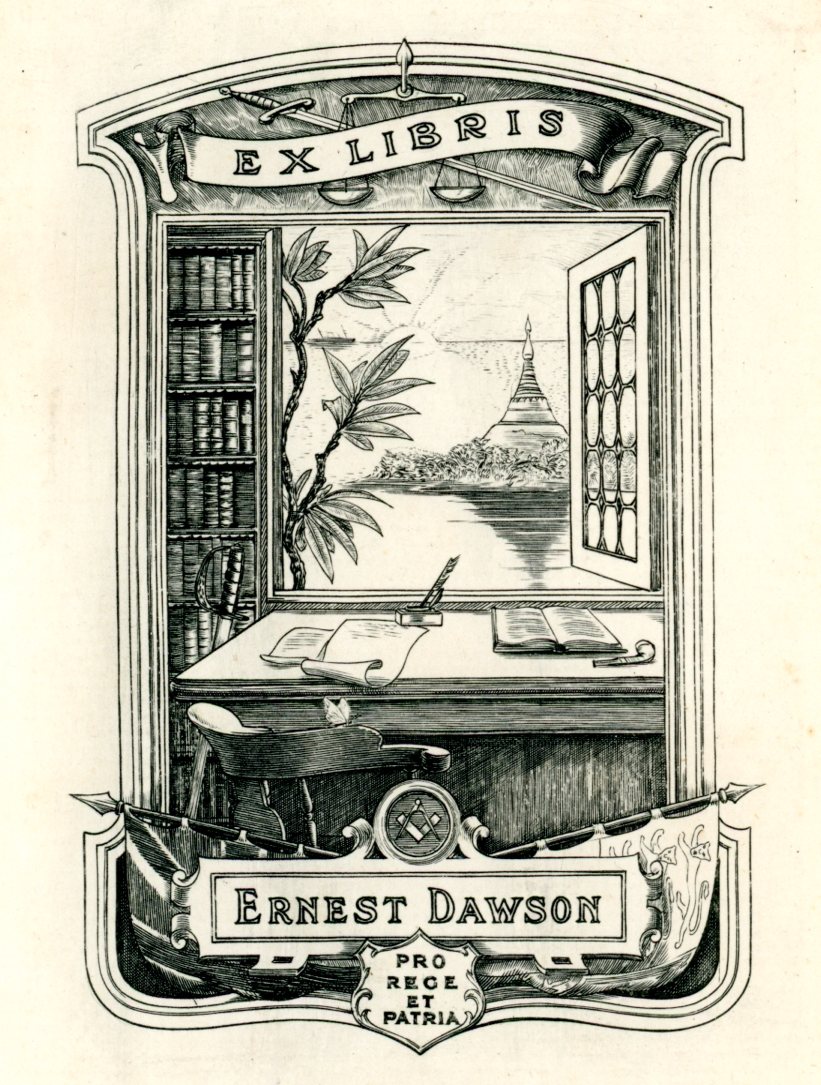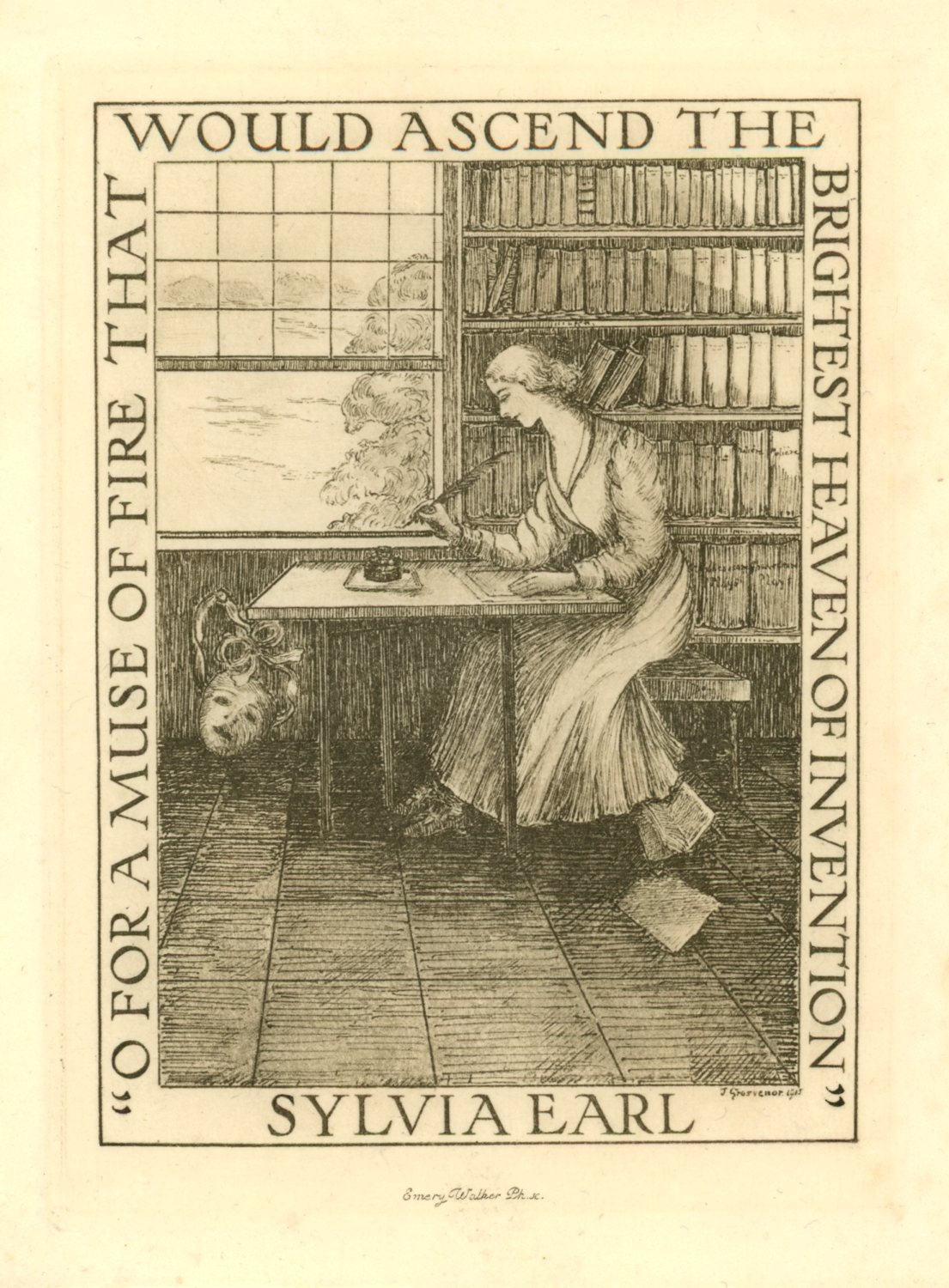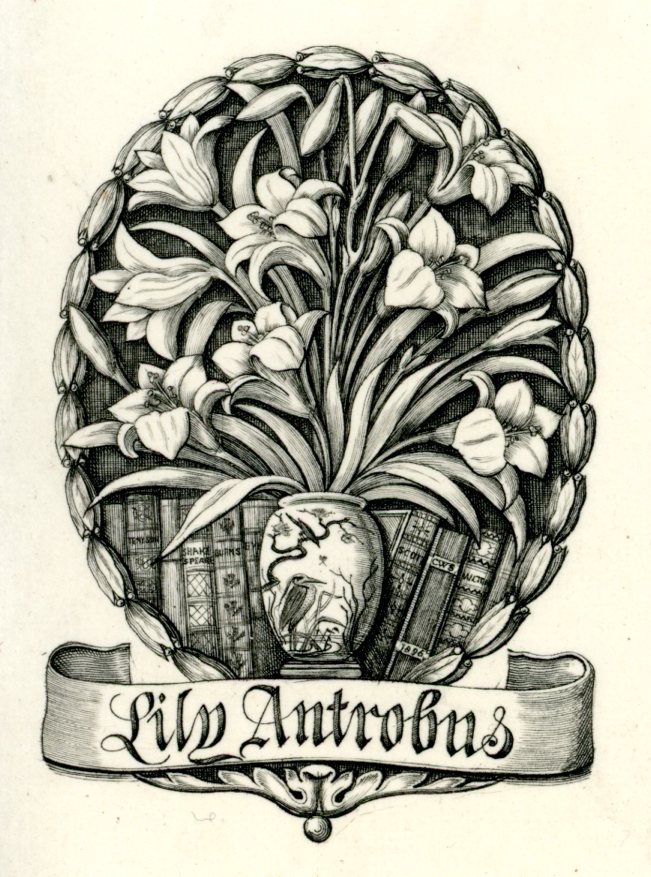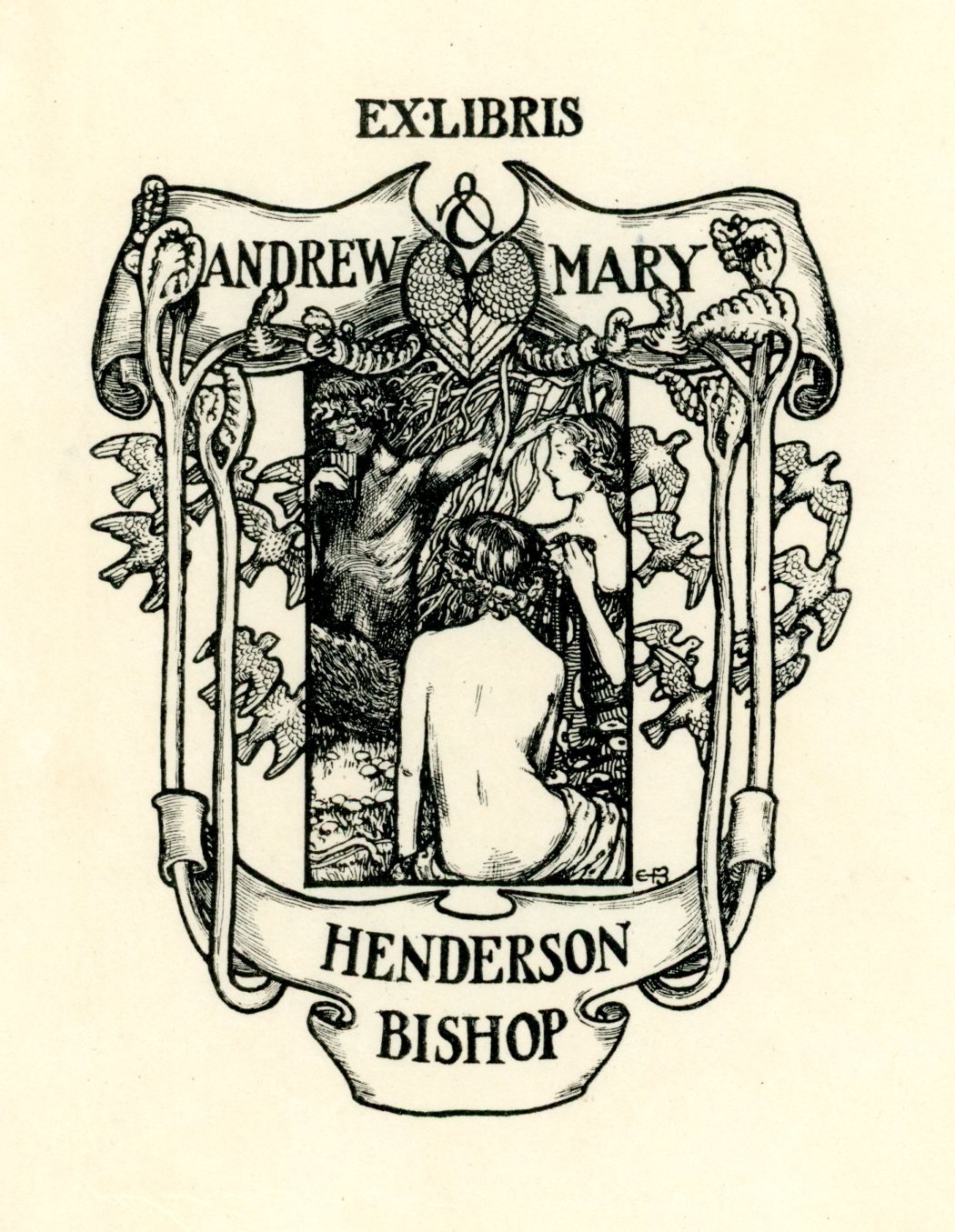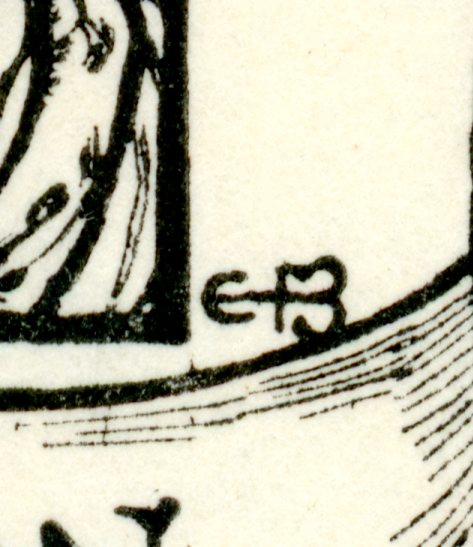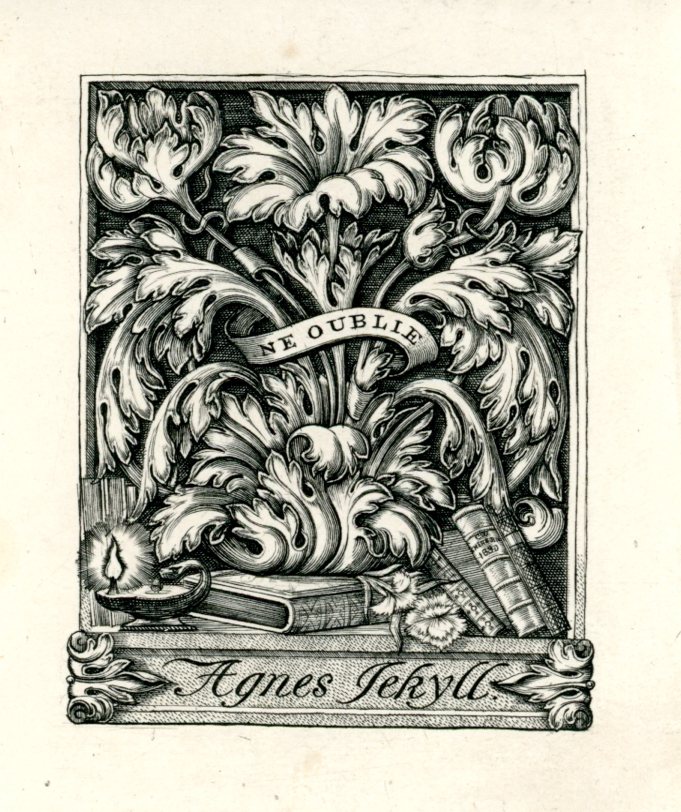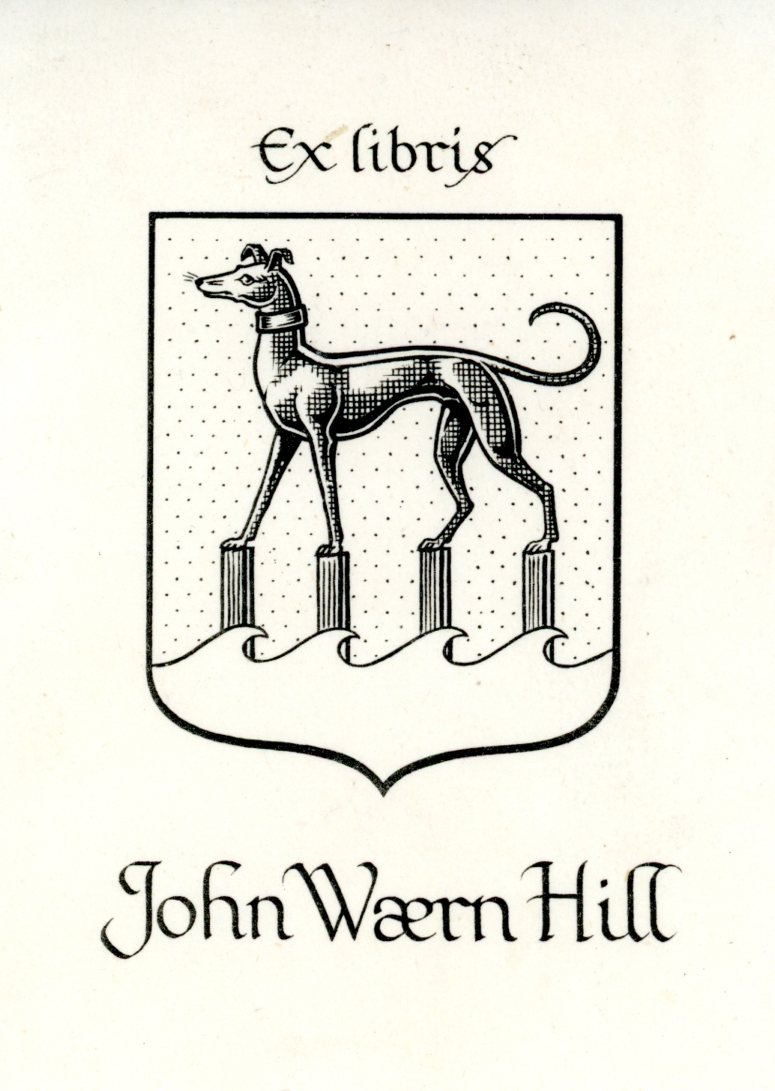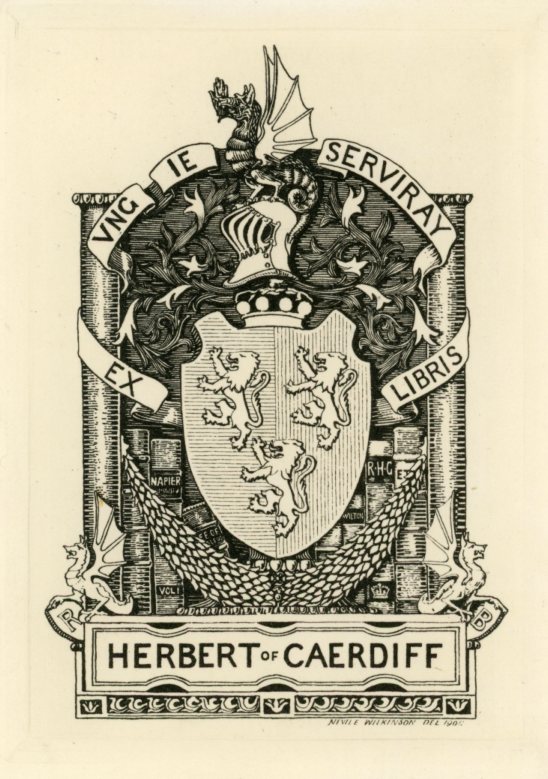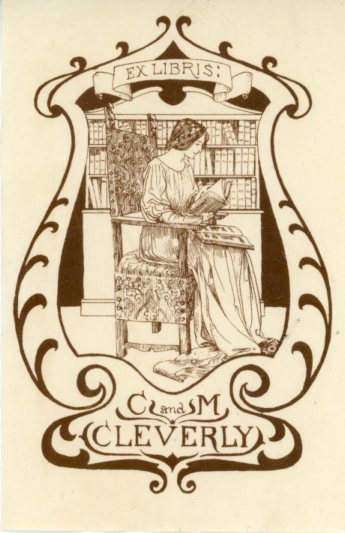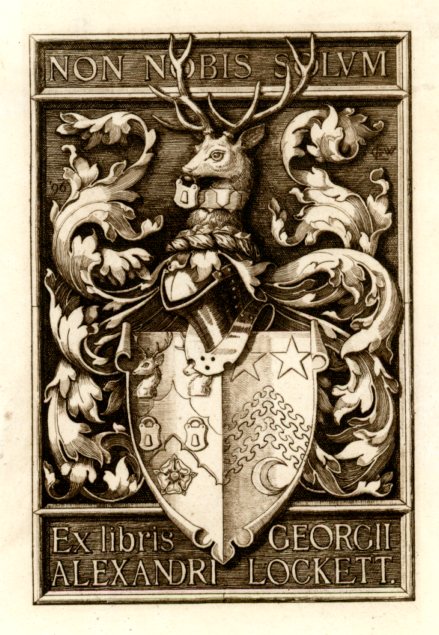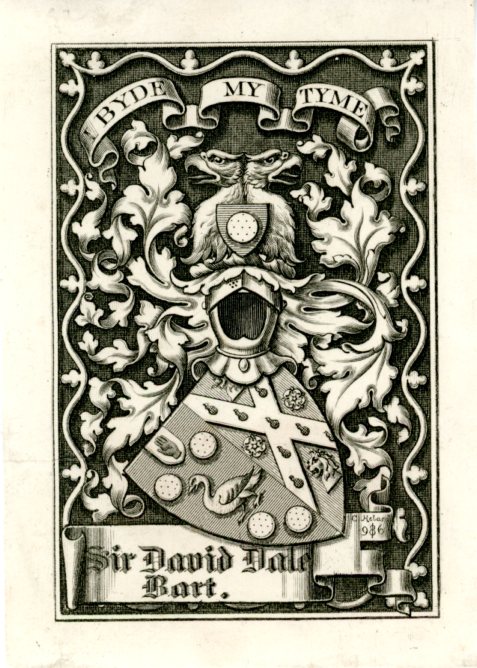Home >> Bookplates >>
A few other bookplates
There is no order or method to my collection of bookplates other than that I prefer pictorial to armorial plates, and I'm not really interested in bookplates designed much before 1900. It's just fun to look inside the front cover of an inexpensive book and find an interesting plate or to come across a bookdealer who has bookplates for sale, which is uncommon. If the bookplate looks interesting and the book isn't too expensive then I buy it, and I still have the book after I have carefully removed the bookplate. It's also nice to have an example of a bookplate by some of the major British engravers of the 20th century, though my collection is not at all comprehensive.
You can click on images to enlarge them a little. Click on the back button of your browser to return to the page.
Added on 5/10/2023: Bookplate designed by G.W. Eve for George Alexander Lockett.
Added on 10/12/2023: Bookplate designed by C. Helard for Sir David Dale.
Thairlwall
Date: 1919
Paper size: 136 x 106 mm
Design: 104 x 75 mm max.
Designer: J.A.C. Harrison
Signed: initials JACH superimposed in scroll above 'QUIDQUID', with 19 either side; and signed in pencil at lower margin, within plate mark, 'John A.C. Harrison fecit.'
Proof: AH
Notes: Although this design shows what may be the ruins of Thirlwall (no 'a') Castle in Northumberland, I suspect that this bookplate was designed for the bookplate collector and writer on bookplates, Frederick James Thairlwall, a member of the Council of the Bookplate Society. A boars head denotes bravery.
Bookplate (click to enlarge)
Leo Wyatt
Date: unk
Paper size: 130 x 92 mm
Design size: 95 x 63 mm
Designer: Leo Wyatt
Engraver: Leo Wyatt
Notes: This bookplate was designed by engraver and bookplate designer Leo Wyatt (1909-1981) for himself. The tools of his trade are shown on the palette in the middle. He was born in South Africa.
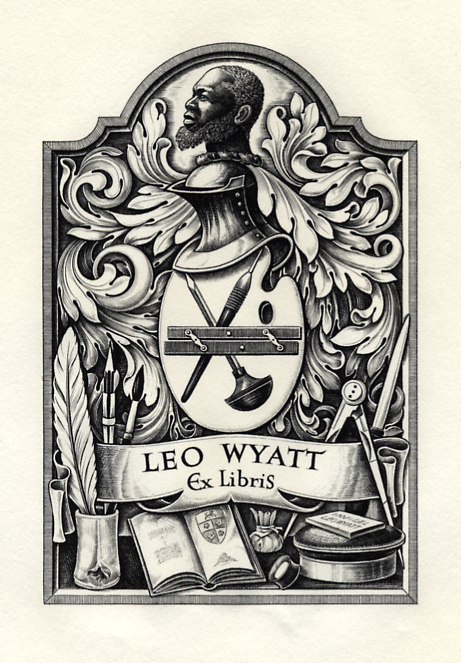
Philip Sassoon
Date: unk
Paper size: 97 x 67 mm
Design size: 88 x 57 mm
Designer: Philip Tilden
Signed: PT (lower right corner)
Notes: This bookplate was designed by Philip Tilden (1887-1956) for Philip Sassoon (1888-1939). The book in which I found it had a label for Port Lympne, Sassoon's house.
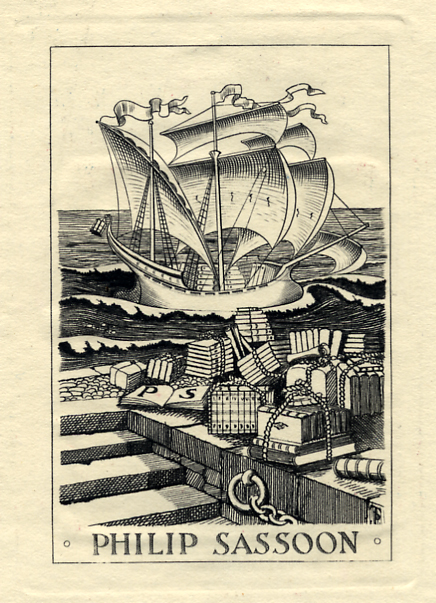
Maurice Baring
Date: June 1897
Paper size: trimmed 63 x 51 mm
Design size: 52 x 44 mm
Designer: Hilaire Belloc
Engraver: Hilaire Belloc
Notes: This tiny and rather crudely engraved bookplate was designed and signed to the right by the writer and poet Hilaire Belloc (1870-1953) for Maurice Baring (1874-1945). It was found underneath the bookplate of Philip Sassoon, above, which was a nice surprise.
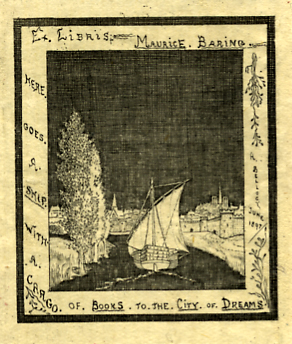
Mary Hunter
Date: unk
Paper size: 114 x 81 mm (trimmed)
Design size: 69 x 105 mm
Designer: Unknown
Engraver: Unknown
Notes: Weird: a vampire bat holding onto an inverted heart. Do you think she had a bad experience in love?
Mary Hunter (1856-1933) was described as a 'society hostess'. She was sculpted in white marble by Auguste Rodin and painted by John Singer Sargent, both of which are in the Tate. Her husband died in 1916 leaving her with £270,000, which is equivalent to about £19.5 million in terms of simple purchasing power in 2021, but she got through it and was forced to leave Hill Hall and sell her possessions. The sale is described in the letters of Virginia Woolfe.
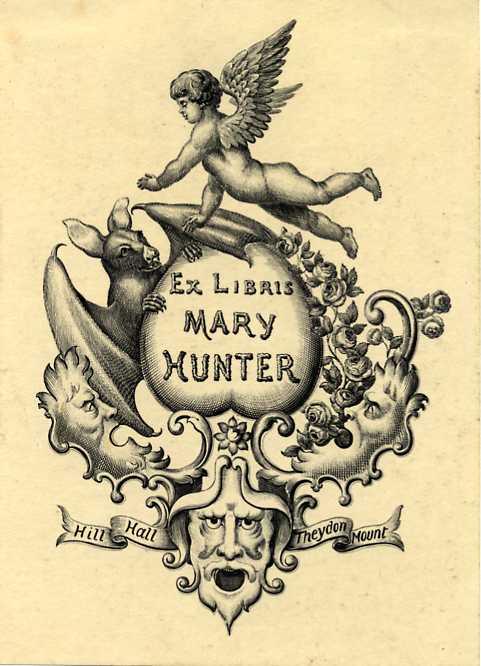
H. Clifford Mortimer
Date: 1904
Paper size: 144 x 101 mm (trimmed)
Design size: 124 x 80 mm
Designer: Bernard Partridge
Notes: A bookplate designed by Bernard Partridge (1861-1945), a famous cartoonist for Punch magazine, for Clifford Mortimer, the father of John Mortimer.
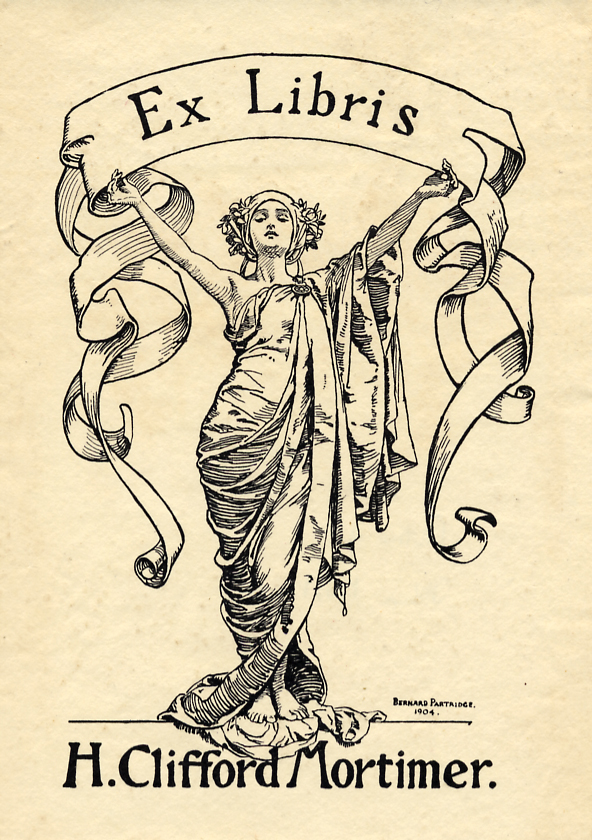
Walter Dexter
Date: unk
Paper size: 138 x 101 mm
Design size: 115 x 75 mm
Designer: Unknown
Engraver: Unknown
Notes: I have found two possible Walter Dexters. An artist named Walter Dexter R.B.A., died in 1958 aged 81 after being knocked down by a motorcycle, but he had two hands according to pictures. However I found this bookplate in a book on etching, so the hook may be a joke. The other Walter Dexter was honorary literary editor of The Dickensian magazine and died on 16th May 1944 aged 66. I don't know who designed the plate, which is initialled R.A.M.
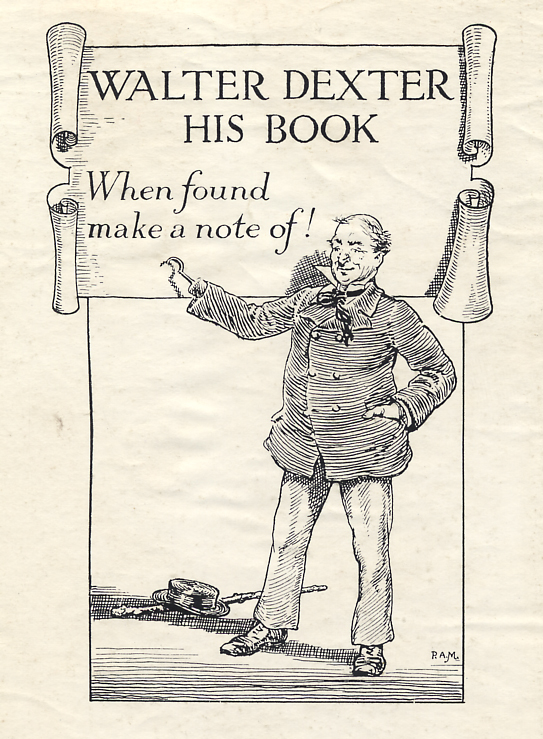
Osbert Salvin and Frederick Ducane Godman
Date: unk
Paper size: 149 x 88 mm
Design size: 127 x 67 mm
Designer: Unknown
Engraver: Unknown
Notes: Osbert Salvin (1835-1898) and Frederick Ducane Godman (1834-1919) were both biologists who studied the flora and fauna of South America. They are linked by the Godman-Salvin medal for ornithology which was instituted in 1919 in their memory. This engraving may be associated with that medal. I don't know who the designer was, but it's quite fine.
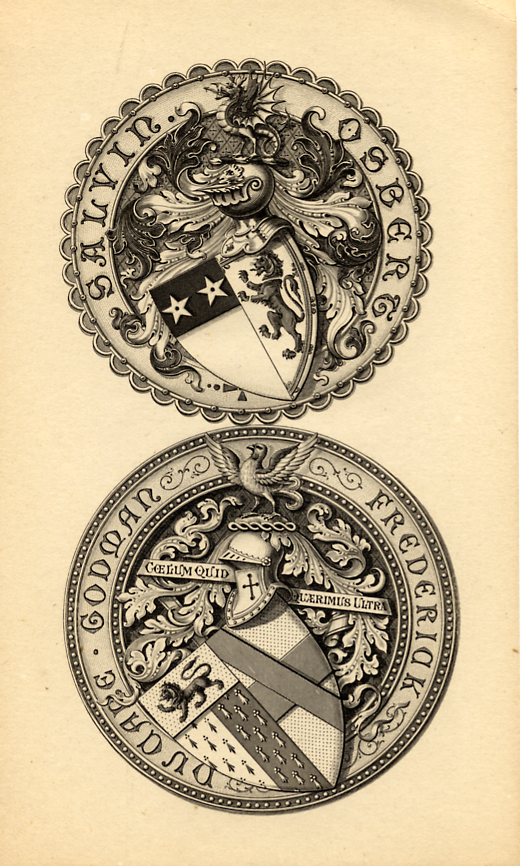
Bradley Martin, Junr
Date: 1905
Paper size: 131 x 104 mm
Design size: 113 x 90 mm
Designer: H.S.
Notes: Bradley Martin (1841-1913) was an American financier and industrialist who rented Balmacaan House and its estate overlooking Loch Ness for many years from the 1880s. The bookplate shows the ruins of Urquhart Castle on Loch Ness and indicates Mr Martin's past times during his visits to Scotland.

Sara Holmes Grant
Date: 1908
Paper size: 122 x 78 mm
Design size: 63 x 42 mm
Designer: Frederick Spenceley
Engraver: Frederick Spenceley
Notes: This plate is signed by the American bookplate designer and engraver, Frederick Spenceley (1872-1947)
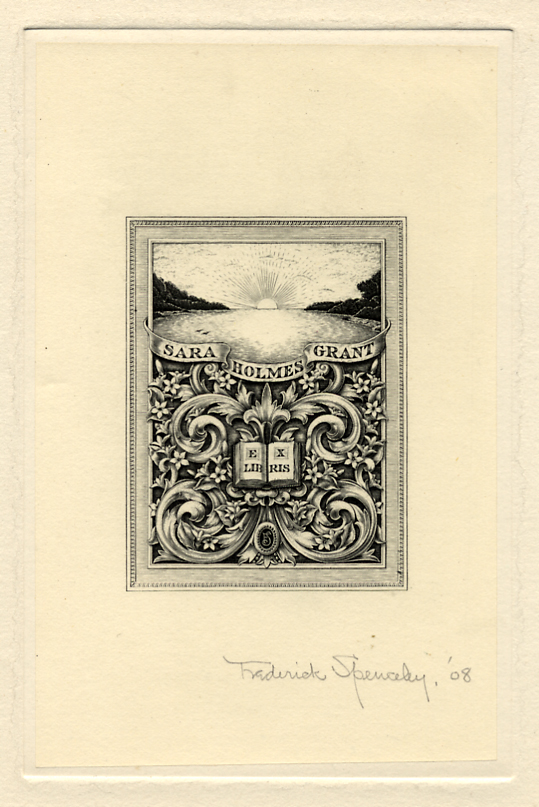
Charles H. Athill
Date: 1870?
Paper size: 114 x 76 mm
Design size: 100 x 61 mm
Designer: Harry Soane
Notes: I have included one armorial design by Harry Soane of London W.C., as an example of his work. The design was for Charles Harold Athill who was Richmond Herald at the Royal College of Arms from 1889 to 1919, so presumably knew how to design a coat of arms.
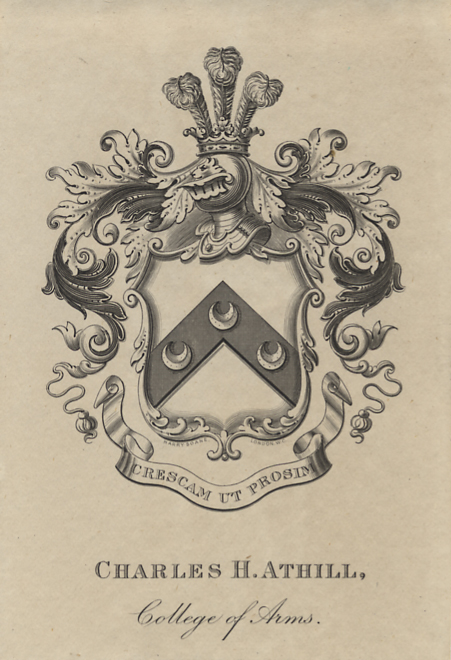
Nathan of Churt
Date: 1941
Paper size: 128 x 103 mm
Plate size: 117 x 92 mm (approx)Design size: 101 x 82 mm
Designer: H J F Badeley
Engraver: H J F Badeley
Notes: This an example of the work of Henry John Fanshawe Badeley (1874-1951), 1st and only Baron, who was Clerk of Parliament and an amateur engraver. He studied under Sir Frank Short and was Honorary Secretary of the Royal Society of Painter-Etchers and Engravers.
This plate was for Harry Louis Nathan (1889-1963), a lawyer and politician. He served during World War 1 as a Major in the 1st London Regiment and was wounded. He was an MP from 1929 until 1940, when he stepped aside to make way for Ernest Bevin, and was created Baron Nathan of Churt in Surrey. The pineapples on the supporters are in fact stylised hand grenades.
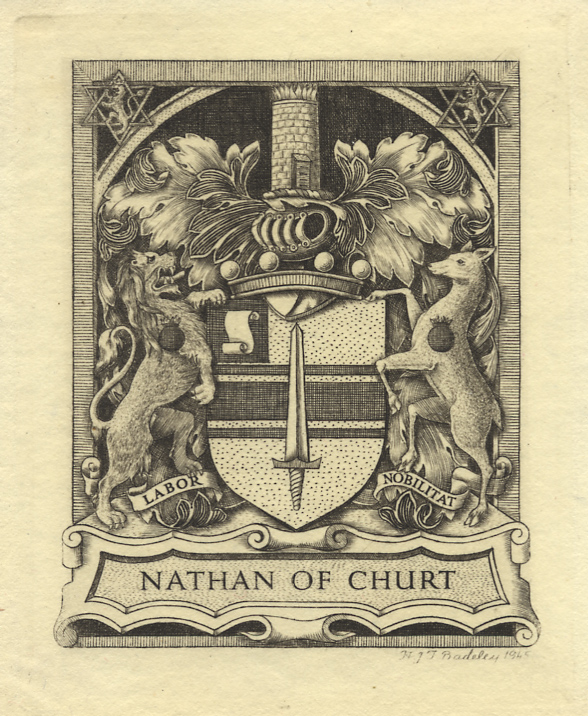
Eric M Fraser
Date: 1930?
Paper size: 103 x 83 mm
Plate size: no plate mark
Design size: 103 x 83 mm
Designer: unknown
Notes: This bookplate was designed for Eric Malcolm Fraser (1896-1960), the youngest of eight sons of Professor Sir Thomas Richard Fraser, a Scottish medical physiologist. He also had three sisters.
When he left Edinburgh Academy in July 1915 he was awarded Dux of the whole school, the Clyde and Millar Greek Prize, a prize for bagpipe playing and 3rd prize in a shooting competition. He joined the Seaforth Highlanders and was immediately appointed as a temporary Second Lieutenant. Fraser was mentioned in despatches in December 1917 as a Lieutenant.
After the war Fraser joined Brunner, Mond & Co. Ltd (later ICI) in 1919. On 8th May 1929 he married Joy Frances Pease (1906-1981) of Darlington at St. Margaret's Church, Westminster (see photograph, below left). She was 23, he was 33. They had no children.
During the Second World War he was appointed Director of Investigations and Statistics at the War Office in 1939; Director-General of Equipment Production in the Ministry of Aircraft Production in 1942; and in 1943 became Director-General of Aircraft Production. He was awarded a CBE in 1946. After the war he worked for Imperial Chemical Industries as a Personnel Manager from 1946 to 1958. He lived at Radnor House, New Street, Henley-on-Thames. He died in 1960, aged 64 y, presumably before enjoying retirement.
I removed the bookplate from a copy of The Gothick North. The Fair-Haired Victory (1930) by Sacheverell Sitwell.
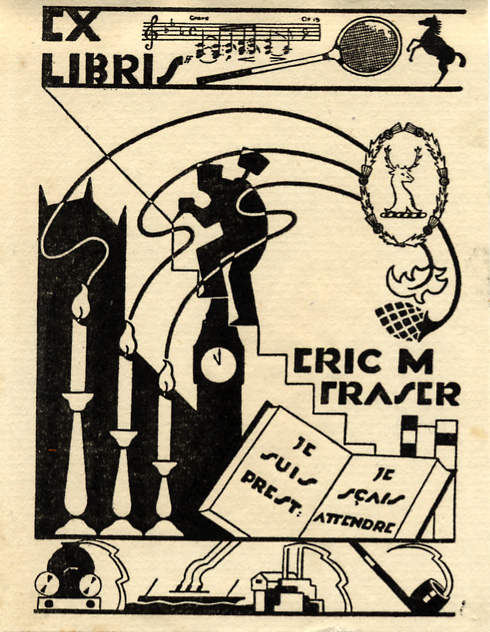
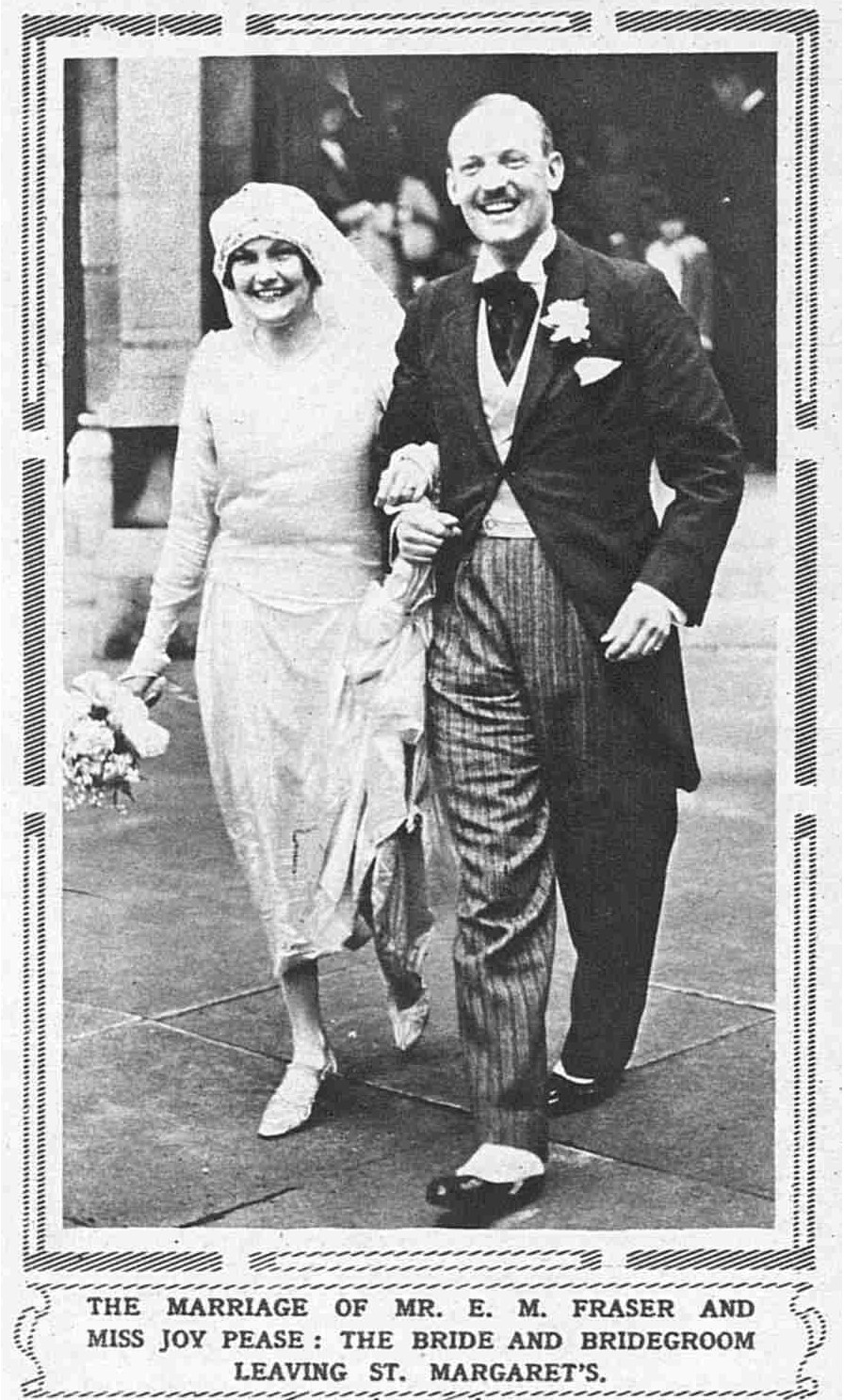
Louise J Sassoon
Date: 1908
Paper size: 112 x 198 mm
Design size: 74 x 65 mm
Designer: INV F.G.H. (Frank George House)
Engraverer: J.A.C. Harrison
Notes: This is an example of a bookplate 'invented' by Frank George House, who was the manager of bookplate printers Truslove and Hanson. It was not engraved by House, but by John Augustus Charles Harrison (1872-1955). I thank Anthony Pincott of The Bookplate Society for this information.
This plate was for Louise Judith Sassoon (1873-1964), the daughter of businessman Reuben David Sassoon. At the age of 40 in 1914, she married Sir Charles Cavendish Boyle, a colonial adminstrator, who was then aged 65 years. He died during an operation two years later, and his widow survived him for another 48 years, dying in 1964 aged 91. She was awarded an OBE for her work in Hove with the Red Cross during World War 1.
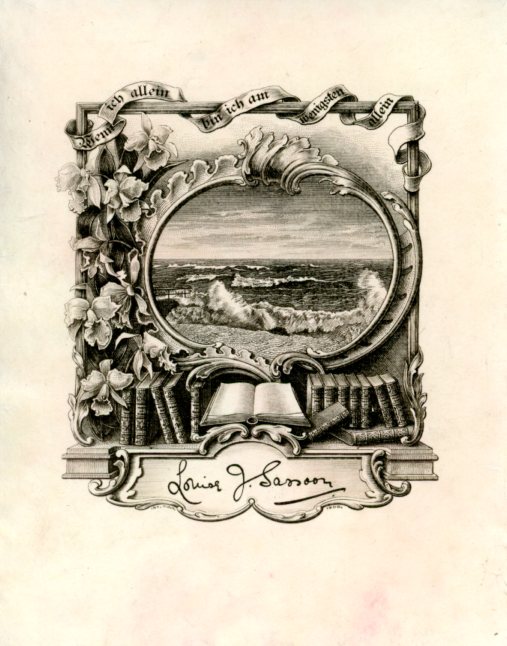
Ernest Dawson
Date: c 1900
Paper size: 116 x 84 mm
Plate size: 95 x 78 mm
Design size: 85 x 60 mm
Designer: unknown
Engraver: unknown
Notes: This bookplate is for Major Ernest Nathaniel Dawson (1864-1949), a younger brother of Alec John Dawson who wrote a book on dogs that was illustrated by Edmund Blampied.
Ernest Dawson was a Major in the British army and became a District Judge of Moulmien, Burma, based in Akyab (see signed title page of the book in which this plate was found). Akyab is now called Sittwe and Burma is now called Myanmar. I have been to Sittwe and visited the Lawkarnada Pagoda, which is shown through the open window with the leaves of what I think is a Frangipani tree. At the top the sword and the scales represent the army and the law, Ernest's two occupations. An emblem of the Freemasons is shown in the circle above the name. The Latin motto means 'For King and Country' with the Union flag to the left and possibly the royal arms of England to the right. There is a butterfly on the arm of the chair, which is a nice touch.
He married Alice Mary Dawson at Christ Church in Rangoon in May 1895 and she divorced him in May 1924 for reasons of 'desertion and misconduct', as he had been found in bed with another woman at a hotel in Euston, usually a contrivance to provide grounds for divorce. He retired to Hastings-on-Sea.
Ernest Dawson knew Rudyard Kipling and Joseph Conrad and gave talks or wrote articles about them.
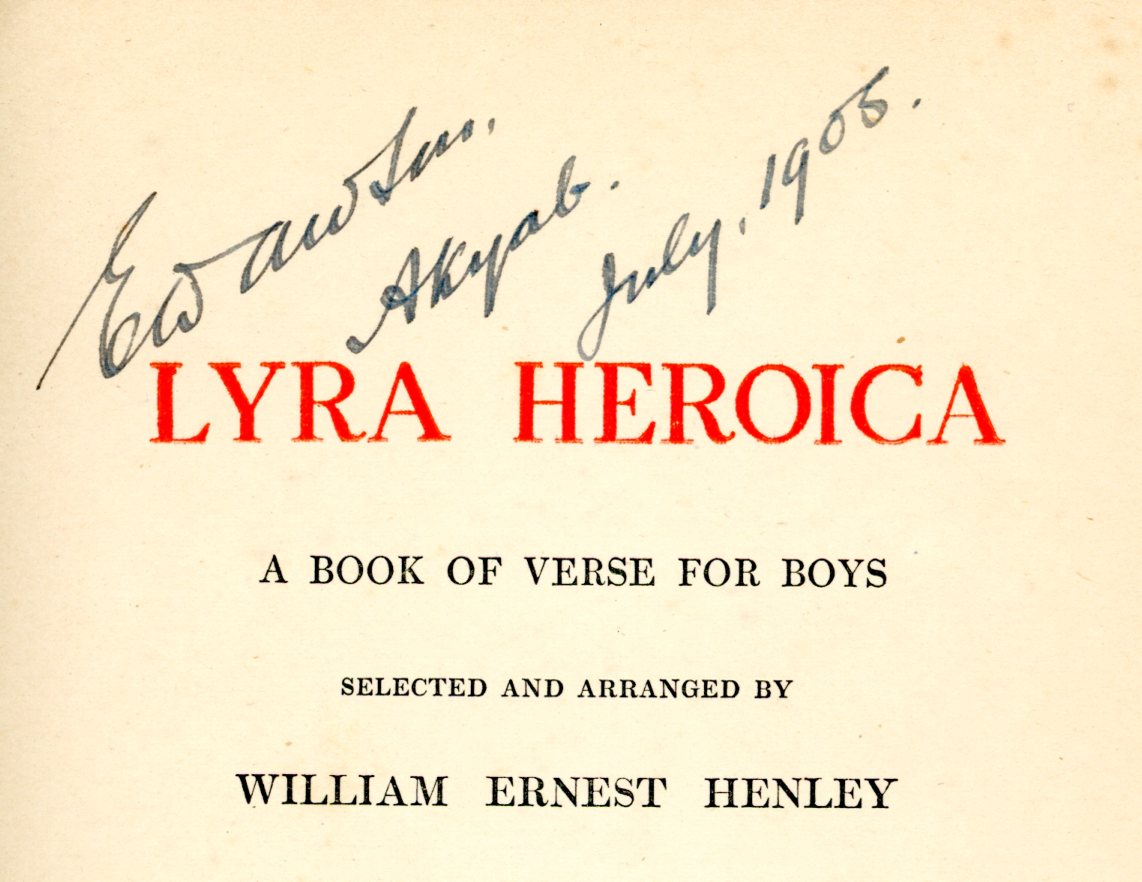
Sylvia Earl
Date: 1915
Paper size: 128 x 96 mm
Plate size: 116 x 85 mm
Design size: 103 x 75 mm
Designer: J. Grosvenor 1915
Engraver: Emery Walker Ph. sc
Notes: This bookplate was engraved by Sir Emery Walker, an engraver and printer who, I suspect, was a friend of Sylvia Earl.
According to newspaper articles, Sylvia Earl wrote plays for her friends, which is what the artist, J. Grosvenor, indicates in his design for this bookplate. One of her plays, a four-act comedy called A Surplus Man, was performed as a single matinee at the Court Theatre in London on Monday 21st July 1924 in aid of the Disabled Soldiers' Embroidery Industry. The eminent cast included Ernest Thesiger, Mary Brough, Irene Rooke, Aubrey Mather and Stella Arbanina. The play was reviewed in The Sketch, The Daily Mirror and The Illustrated Sporting and Dramatic News. I can find nothing more about her.
Lily Antrobus
Date: 1896
Paper size: 96 x 59 mm
Plate size: not known
Design size: 67 x 47 mm
Designer: CWS 1896
Engraver: Charles Sherborn
Notes: This bookplate was designed and engraved by Charles William Sherborn in 1896 for Elizabeth 'Lily' Antrobus (b c1867, d 16th November 1944, aged 77). His initials and the date are engraved on the spine of one of the books. Lily was the daughter of Hugh Lindsay Antrobus, a Director of Coutts, a bank. When he died in 1899 he left her £10,000, equivalent to about £1,150,000 today in terms of purchasing parity. In 1903 she lived at Cadogan Square in London. In 1907 she was a member of both the Ladies Automobile Club and the London Automobile Club and drove a Hotchkiss 29-31 h.p. car, possibly the 2-door tourer. In 1908 she had a house built for her a French style in nearly 18 acres of land at Tilford in Surrey called Charles Hill Court. She collected English pottery and gave many pieces to the Victoria and Albert Museum.
Andrew & Mary Henderson Bishop
Date: 1920s
Paper size: 165 x 114 mm
Plate size: not known
Design size: 95 x 71 mm
Designer: Unknown
Engraver: See detail
Notes: This bookplate was for Andrew Henderson Biship (1874-1957), who was Chairman of Cooper & Co., Glasgow, a large general shop, and his wife Mary Gibb Henderson Bishop (1870-1935), daughter of Sir Robert McAlpine, whose building company still exists today. She was 13 years younger than her husband when they married but died aged 64. He lived for another 22 years to die in 1957, aged 83.
The design seems to be a woodcut but the artist, probably Scottish, is not known. The designer's initials or motif are shown in the detail. They could be letters or an anchor on its side. If you know who this is, please let me know.
(Click to enlarge)
(Detail: click to enlarge)
Agnes Jekyll
Date: 1890
Paper size: 70 x 59 mm
Plate size: none
Design size: 55 x 45 mm
Designer: Charles Sherborne
Engraver: Charles Sherborne
Notes: his bookplate was designed and engraved by Charles William Sherborn in 1890 for the artist, writer and philanthropist Dame Agnes Lowndes Jekyll née Graham (1861–1937).
John Waern Hill
Date: 1950s
Paper size: 95 x 70 mm
Plate size: none
Design size: 71 x 50 mm
Designer: Unknown
Engraver: Unknown
Notes: This simple bookplate was designed for John Waern Hill (1926-2009). He is described on a page on the web site of the Royal Academy as a 'Book collector'. That's all I know about him. This bookplate was found in a book costing £1 on the shelves outside the Hay Cinema Bookshop in Hay on Wye. It was the only bookplate I found on a visit in October 2022 that was in a reasonably priced book. Frankly I think that Hay on Wye is where books go to die. All the best books are sold online I suspect, and the unsellable books go on the furlongs of shelves with piles of remainders.
Herbert of Caerdiff
Date: 190?
Paper size: 143 x 107 mm
Plate size: none
Design size: 114 x 89 mm
Designer: Nevile (Rodwell) Wilkinson
Engraver: Unknown
Notes: This was probably designed for Sir George Sidney Herbert (1886-1942), son of Sidney Herbert, 14th Earl of Pembroke. The crest and motto are used by the Herbert family. This plate was designed by Sir Nevile Wilkinson (1869-1940), an Army Officer, Ulster King of Arms, artist and amateur bookplate designer. Nevile Wilkinson married George Herbert's sister, Beatrice Frances Gertrude Herbert in 1903, so they were brothers-in-law. George Herbert died unmarried, aged 55. A more elaborate bookplate by Wilkinson for Herbert is in the collection of the British Museum.
'Caerdiff' is an old spelling of Cardiff. The reason for the letters R and B by the dragons left and right on the plate are unknown, but could be the initials of the engraver. The last digit of the date is not clear. The name on one of the books is 'WILTON': George Herbert was a Director of the Wilton Royal Carpet Factory.
C and M Cleverly
Date: 190?
Paper size: 91 x 59 mm
Plate size: none
Design size: 81 x 54 mm
Designer: (Charles Cleverly)
Engraver: (Charles Cleverly)
Notes: This was probably designed by the artist Charles Frederick Moore Cleverly (1852-1921) for himself and his wife Mary Isabel Cleverly neé Somers. There is no signature and it has an art nouveau look, so is probably early 20th century.
Charles Cleverly was born in Canton in China, the son of Charles St. George Cleverly, who was Surveyor General in Hong Kong. Charles worked as an architect and artist and was a Justice of the Peace in Surrey. He died in Valescure, France on 16th March 1921, while on holiday. His son, Sir Osmund Somers Cleverly, was Principal Private Secretary to both Stanley Baldwin and Neville Chamberlain.
Georgii Alexandri Lockett
Date: 1896
Paper size: 142 x 115 mm
Plate size: none
Design size: 97 x 65 mm
Designer: George William Eve
Engraver: George William Eve
Notes: This was designed in 1896 by G.W. Eve (1855-1914) for George Alexander Lockett (1855-1923), a merchant who traded in nitrate mined in Peru and Chile. There he met and later married Emma North, the daughter of 'Colonel' John North (1842-1896), called 'The Nitrate King'. They had no children. Emma inherited a quarter of her father's estate and then her husband's, so was probably quite well off in 1923 at the age of 55 when her husband died. Emma died in 1941 aged 73.
This is probably the later variety of the bookplate in which the design has been modified to include a decrescent in the North part of the coat of arms, perhaps reflecting the fact that it was modified by Emily Lockett after her husband had died. The bookplate was found in a book published in 1926, three years after George had died. The other half of the shield has two padlocks and there is a padlock in the mouth of the stag, plays on the name 'Lockett' I presume. The modification to the design was done by an engraver other than G.W.Eve, who had died in 1914.
Sir David Dale, Bart.
Date: 1896
Paper size: 115 x 82 mm
Plate size: none
Design size: 97 x 65 mm
Designer: C. Helard
Engraver: C. Helard
Notes: This was designed in 1896 by C. Helard, the pseudonym of the engraver and bookplate designed Mary Ellen Blanche Fox-Davies nee Crookes (b 7 October 1870; d 25 April 1935). She was the wife of Arthur Charles Fox-Davies (1871 – 1928), an expert on heraldry. Her son, Major Harley Edmond Fitzroy Fox-Davies died in 1941 aged 33 in Libya during World War II.
Sir David Dale (1829 - 1906) was an industialist who applied the principle of arbitation to industrial disputes.
